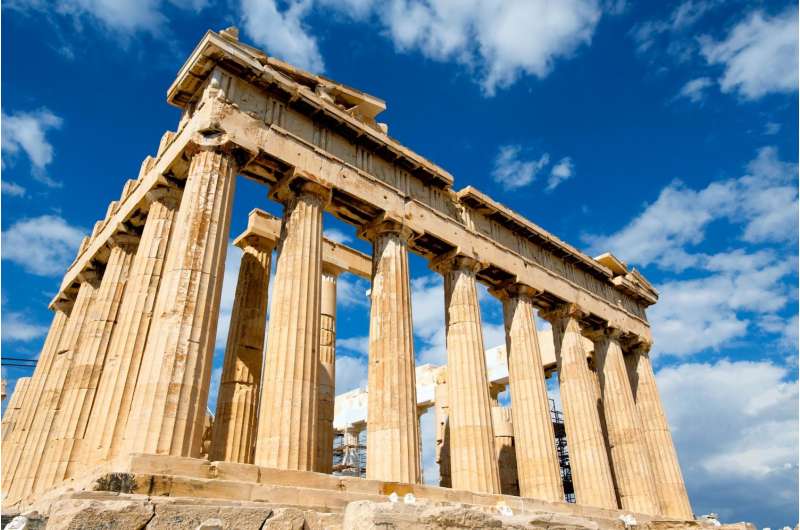Travel back to ancient Greece in virtual reality

A new virtual reality (VR) app which takes users on a journey back in time to ancient Greece where they are able to experience first-hand what it was like to consult with the Greek god Zeus at the Oracle of Dodona has been developed by a team of academics led by the University of Bristol.
The aim of the project is to enhance historical understanding of ancient Greek oracle consultation and to explore the role of VR technology in classrooms, museums and cultural settings. It also aims to provide insights and a richer understanding of sensory processing and brain activity in users of VR.
An oracle was a site where ancient Greek men and women asked the gods to answer questions about the past, the present and the future often writing down their questions on lead tablets—many of which have survived to the present day.
Dodona in Epirus, north western Greece, was one of the oldest oracle sites dating back to the second millennium BCE with some of the earliest accounts describing Dodona as an oracle of Zeus. It was considered second only to the more famous Oracle of Delphi in reputation and remained an important religious sanctuary until the rise of Christianity during the late Roman era.
The VR experience draws on ancient evidence to imagine a visit to the oracle of Zeus at Dodona in 465 BCE. Users can choose one of three pathways to meet other pilgrims and hear their stories, before they are able to pose their own questions to the priestesses of Zeus.
Project lead Professor Esther Eidinow from the University of Bristol’s Department of Classics and ancient History said, “Oracles helped ancient society to cope with uncertainty and risk. We are focusing on the oracle at Dodona because thousands of questions have survived from the site, written on lead tablets.
“They show that the oracle was consulted not only by community leaders, but also by ordinary men and women, including enslaved people. Studying Dodona can help us to understand their experiences better: both how they responded to uncertainty, and how they related to the gods.
“This project can help us to better understand both ancient and modern experiences —ancient experiences of a religious ritual and modern experiences of an immersive historical environment.”
While creating the app, the team consulted with a range of potential users involving them in its design and development. This included sessions with visitors at Bristol Museum and Art Gallery.
Professor Kirsten Cater from Bristol’s Department of Computer Science, said, “In order to create the best VR experience we involved teachers, students, and museums in the design process through co-production, as well as supporting them as users of the final product.
“This approach could have significant findings for enhancing the design and effectiveness of digital cultural experiences, specifically immersive experiences, for use in museum/heritage and educational contexts.”
Dr. Michael Proulx from the University of Bath’s Department of Psychology, added, “This creative study of ancient history will allow us to make cutting-edge advances in the psychological use of modern technology.
“In examining the experience of an oracle, our methods are revealing what it is like to feel present in that place and moment—almost like a form of time travel to better understand the past.
“This will also help with future VR development as we’ll have a richer understanding of the role of multisensory processing and integration to help make VR seem real. The nature of the oracle experience, being something novel for modern people, provides a good basis for creating other virtual experiences outside of our daily lives.”
The Virtual Reality Oracle experience is available for free download across multiple platforms. A version compatible with Google Android-based smartphones can be downloaded from the Google Play store and combined with widely available cardboard VR headsets to provide a low-cost entry-level virtual reality experience.
Users of the Meta range of VR headsets (e.g. Quest / Quest 2) can download the app directly from the Meta Store.
A 360-degree video version that is compatible with desktop computers and tablets can be found online via YouTube. For more information and additional support, visit http://www.vroracle.co.uk/experience
Citation:
Travel back to ancient Greece in virtual reality (2023, June 30)
retrieved 30 June 2023
from https://techxplore.com/news/2023-06-ancient-greece-virtual-reality.html
This document is subject to copyright. Apart from any fair dealing for the purpose of private study or research, no
part may be reproduced without the written permission. The content is provided for information purposes only.
For all the latest Technology News Click Here
For the latest news and updates, follow us on Google News.
